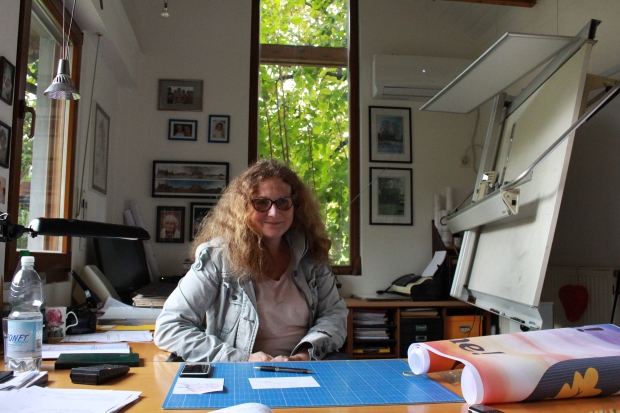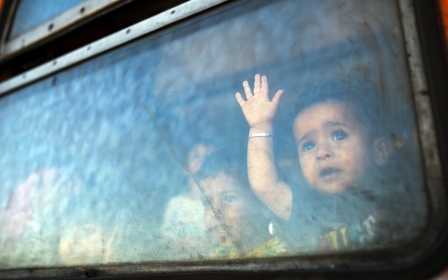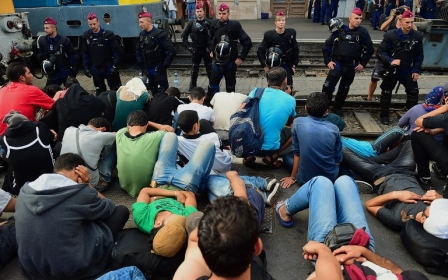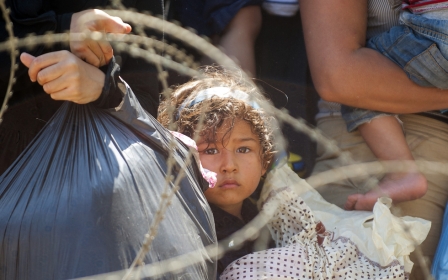The story behind the German town that said 'Welcome' to asylum seekers
OER-ERKENSCHWICK, Germany - A tiny former mining town of 30,000, Oer-Erkenschwick sits among the fields and factories of far northwest Germany. So insulated from the violence plaguing Europe's borders further east, its residents could hardly have expected to be thrust into the spotlight of what many are calling Germany's "refugee crisis".
Germany, the most prosperous and populous member of the 28-member European Union, is expecting upwards of 800,000 asylum seekers this year, up 400 percent on last year's total. Last Monday around 130 of them arrived by bus in Oer-Erkenschwick after reception centres in larger towns in the state became so overwhelmed that they locked their doors, leaving new arrivals to sleep in drizzly parks for nights on end.
A video of what came next went viral last week, amid a slew of news so heart-rending that locals say they no longer turn on their televisions. The image of the body of Aylan Kurdi, the toddler from Syria whose drowned body washed up on a beach near a Turkish tourist resort this week, stirred many around the world to tears, and to anger. Just a week earlier, the warm welcome for a busload of asylum seekers got from residents of this small German town had seemed to represent an alternative to this unimaginable tragedy: it was for many a picture of what a Europe with open borders and open minds could look like.
"We didn't have a long time to put it together, because we didn't know when exactly they would be arriving," said Christine Schaefer, the local architect who steps away from lunch with her grandchildren to explain why she organised the welcoming party. "It's a small town, and I know a lot of people here. I rang people from the church, the town's football teams, the youth group. My children put the word out on Facebook, and it spread very quickly." Within hours, more than 75 people had gathered behind a sign emblazoned with the word "Welcome" in three languages.
"I actually expected that word would spread so fast. Most of the time, people just need to know that they are not alone, and then they can take a positive step. But I was surprised that so many came."
"What you don't see in the video is all the police standing around. They were there, and we were partly there, because a far-right group also planned to come when the asylum seekers arrived. In the end there were around 30 of them."
There was no violence on the day, although many asylum seekers already living in the town said they stayed away for fear they would be targeted. Another far-right demo planned for the following Friday was eventually cancelled, Schaefer said, a decision she puts down to the video's popularity. "Perhaps because the reaction to it was so positive, they saw that they were not welcome here."
As the video went viral, journalists from newspapers all over the country descended on the usually sleepy town. One of the key groups that took part in the welcome party begged not to be identified in the press, fearing that it would be targeted by local far-right extremists. Later, driving past her church, which also doubles as a German language school for people awaiting their asylum interviews, Schaefer says she doesn't fear that it will be attacked. "Those [far-right supporters] who live here wouldn't dare attack us. It's really a very small town."
Now that the dust has settled, the real work has begun. A primary school that shut its doors last summer has been hastily converted into an emergency reception centre complete with healthcare facilities, bedrooms and play centres. Signs in three languages line the walls next to colourful posters drawn by the children, bearing the words "Iraq" and "Kurdish YPG". The German Red Cross, which runs the centre, is financed by the German government. But volunteers also dole out packages of clothing and food donated by local churches and the town's three mosques.
Oer-Erkenschwick is diverse for a town of its size, a fact attributed to the waves of guest workers who arrived from Italy, the Czech Republic and Turkey to work in the local coal mines. But the security centre established at the camp gates attests to a fear that the latest wave of newcomers, though small in number, could attract negative attention from the few far-right activists in the town. "Some of the neighbours are scared of the asylum seekers," said Ralf Farvick, who has volunteered with the Red Cross since 1976 and last dealt with a similar wave of migration into Germany in 1986. "But the numbers are small," he said, carrying a crate of donated baby food.
Most of those who are living in the camp have no idea how long they will stay. Even before the latest uptick in the numbers of those arriving, some people were waiting as long as 18 months just to have their asylum appeals heard. In that time, they are not allowed to work or receive state money equivalent to that given to German citizens, so locals have developed alternative support systems, putting on inter-cultural coffee mornings and fixing up bikes to help asylum seekers get around town cheaply.
Even with this extra support, charitable organisations are unable to meet the wildly differing needs of the people here, many of whom are deeply traumatised both by their experiences back home and by the treacherous journeys they were forced to take to get here. Eighty-six-year-old Bayer, from Kirkuk in northern Iraq, shuffles slowly through the camp on a brand new Zimmerframe he got when he arrived. Later, he breaks down in tears describing the journey he and seven members of his family took by night through a Europe where police have regularly been seen dousing fleeing migrants with pepper spray. Bayer says he and his family plan to stay here. "The people are so good here," he explained, wiping his eyes.
Others, though, want to travel on further, despite the difficulties they are sure to face.
"I would love to go to the UK," said Farid, a Syrian Kurd who lived in Damascus before beginning his month-long journey to Europe in July. "But David Cameron is so strict with refugees."
New MEE newsletter: Jerusalem Dispatch
Sign up to get the latest insights and analysis on Israel-Palestine, alongside Turkey Unpacked and other MEE newsletters
Middle East Eye delivers independent and unrivalled coverage and analysis of the Middle East, North Africa and beyond. To learn more about republishing this content and the associated fees, please fill out this form. More about MEE can be found here.





